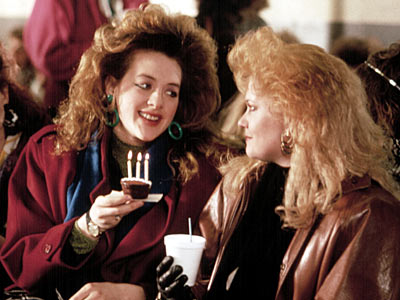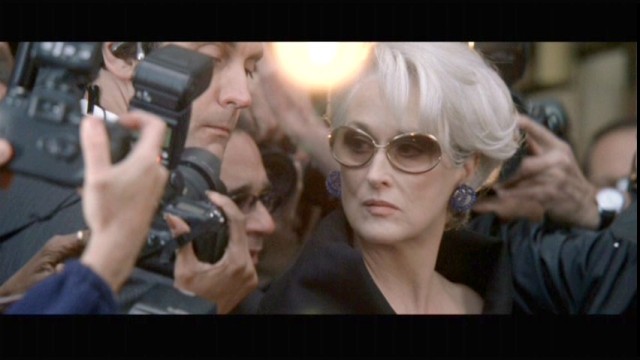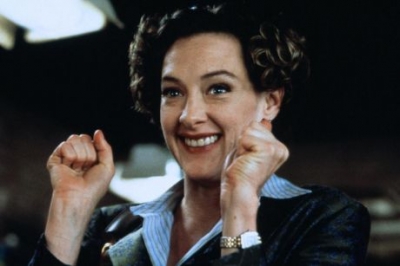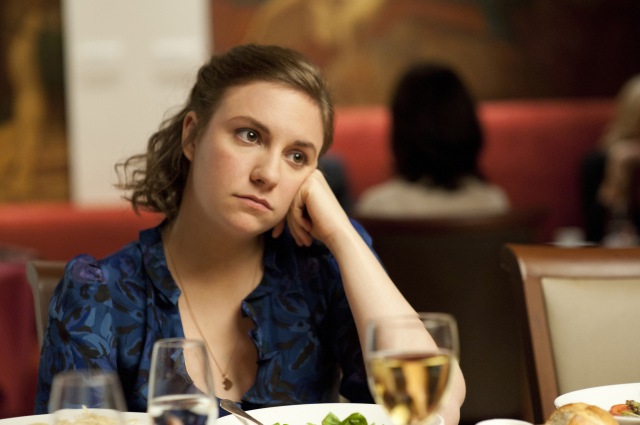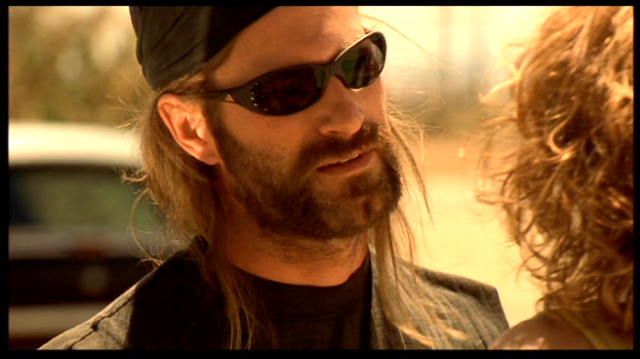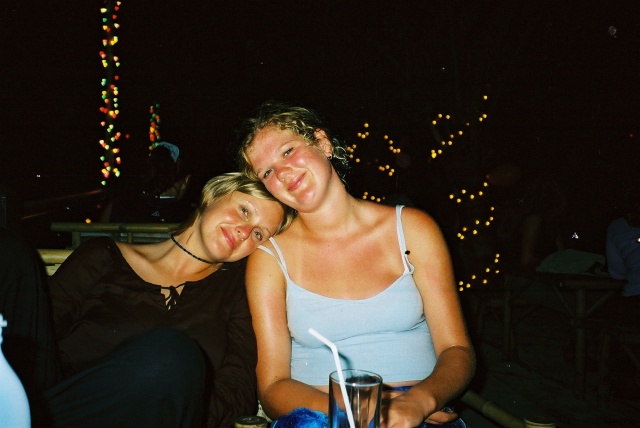It’s my 30th birthday today! To celebrate the occasion I have decided to reproduce on my most controversial, and heartfelt, pieces from the year. My question to you, is: Have the assumptions of masculinity, hypersexualisation and polyamory in queer circles created a false hierarchy between the ideal queer and the everyday realities of lived queer lives?
I had never thought much about asexuality until a couple of years ago when, for the first time in my adult life, I lost my sex drive. I mean, I didn’t actually lose it. It wasn’t hiding under the bed or anything, gathering dust with old shoes and mouldy peanuts. It just went on a holiday, to give me the time and space to sort some stuff out. Thank you, sex drive. That was very considerate of you.
Up until that point I had what I considered a very active libido. You know that old myth that men think about sex every seven seconds? Well, as a teenager I thought about sex so much that I didn’t doubt this myth was true. I just assumed it must extend to women, because I thought about sex all the time. This pretty rampant sex drive has followed me throughout most of my adult life, until, as I said, 2 years ago when I became depressed.
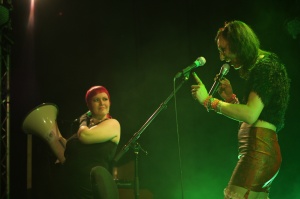
As well as being horny, I am a pretty radical person. I am what Caitlin Moran calls a ‘stringent feminist.’ The kind of woman who will make any dinner party awkward by calling out the conservative dude in the tie on his ha-ha, light-hearted jokes about women or race or the working classes. Oh, so funny! I am the stuff nightmare dinner parties are made of.
I am also queer, femme, into BDSM, curious about dating cis men, and all sorts of other interesting things. I consider myself sex positive and pretty non-judgmental when it comes to other people’s sexual adventures. I do my best to live by my feminist code of ethics. My feminism means that I believe we are all a little transphobic, sexist, homophobic, classist and racist because we live in a patriarchal society that is founded on these hierarchies.
We give men the upper hand by putting down women; we use racist theories to justify white supremacy, classism to explain a world-order in which most people starve while a few thrive, etc etc etc. My feminism means that I recognise I have all of these prejudices inside me and that I think it is my job to diminish them. This doesn’t mean that I am constantly beating myself up about what a horrible person I am, it’s more that I recognise my own flawed position. This is a pretty difficult attitude to take. Seeing some people behave in the most horrible ways and understanding the fucked-up logic behind their actions is exhausting. Dismissal is easy. Empathy is complicated.
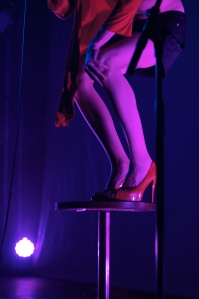
Queer feminism has allowed me to embrace my kinky side and learn much about non-cis gender identities and LGBT history. But I also find massive flaws in the dynamics of the queer communities I know. There are three assumptions commonly made in queer circles, each of which creates a false hierarchy between an ideal of queer and the reality of many lived queer lives. These three assumptions are: hypersexualisation, the idea that everyone wants to have sex all of the time (and if you don’t you’re repressed); that polyamory is a natural desire and wanting to form monogamous relationships means you have jealousy issues; that masculinity is the hottest thing ever and being feminine, especially as a woman, means you are brainwashed. So, as someone who currently doesn’t want to have sex; prefers monogamous relationships and – shock horror – loves wearing dresses, I’m not being a very good queer at all, am I?
I didn’t come to this realisation out of virtue – I had never thought much about asexuality or people who choose not to or don’t want to have sex before – I came to it following a profound personal crisis. Having always had a pretty raging sex drive, the queer assumption that we all want to have sex all the time made sense to me. But losing my sex drive cut me out of the queer community. It meant that I saw no more reason to socialise in it. How’s that saying go? Oh yeah: if you can’t stand the heat, get out of the kitchen.
Sex positive feminism has done a lot of good. In a world which tells anyone assigned female at birth that all we want to do is find a heterosexual male partner and have babies, sex positivity has allowed us to carve the space in which to express our own sexual desires.
The celebration of polyamory, too, isn’t in itself a bad thing. The problem comes when polyamory is glorified as the ‘natural’ state of relationships, and if you’re monogamous you have jealousy issues and have been brainwashed. Erm, hasn’t gender theory taught us feminists anything? Since when did we start embracing words like ‘natural’ to describe our identities? Surely we have learnt to be hesitant about the monolithic meanings of such a word. As deconstructionists don’t we find claims that things are this way for everyone a little bit sketchy? No? Oh, OK. Moving on.
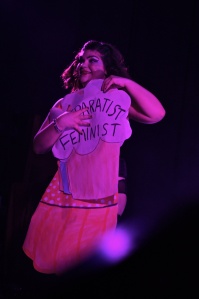
Now comes the moment for the trump card in this loving critique of queer feminism. Now it’s time to get the big skeleton out of the queer community’s closet. And that skeleton is -, sexism! What? Sexism? I hear you cry? How can queer feminism possibly be sexist? I mean, we queers have deconstructed the male/female binary and concluded that gender behaviours don’t go hand in hand with vague ideas about biology and evolution. How dare you accuse us of such a thing?
‘I can’t be sexist because I’m queer’. We hear this quite often. Don’t we?
Well, my friends, sad as it may be, it’s time to face up to the facts. Walk into a queer space and what do you see? A uniform of plain black hoodies, asymmetrical hair and caps. There’s not a dress to be seen. Not a hint of colour, lipstick, of long hair.
Despite all our lip service to multifarious gender identities, there is only one gender that we really celebrate in this queer community, and that is masculinity.
The boyish woman, the gender queer and the trans man are the epitomes of hotness in queer scenes. If you’re a feminine woman, cis or trans, then you are just not cool. Transmasculinities are at the top of the queer pile, pushing transfemininities down to the bottom.
Personally, I think this prejudice is unintentional. Talk to any good-meaning queer and they’ll be shocked when you mention things like sexism and femmephobia. But despite individual professions of innocence, we are all guilty. Any time I ignore a feminine woman in a queer bar because I assume she is straight, I am being just as sexist as the people who exclude me.
As Flavia Dzodan suggests in her recent article on sex positivism and race, the assumption that our desires are innate and not learnt, is worth questioning. How asocial and apolitical can our desires be? If no one professes to fancy femininity doesn’t that reflect our internalised misogyny? If we truly were free lovers, if we did express our natural desire and identities, then surely there would be a proliferation of varying desires and genders in our queer spaces. There wouldn’t be a uniform of jeans and t-shirts and strictly boi-on-boi action.
It’s true that not wanting to have sex or a lover has led me to feel alienated from the queer scene. Combine this feeling with my realisation that I prefer to date monogamously and have a very strong femme identity and I no longer feel included or appreciated in the community I have made my worldwide home for the past 6 years. And I am not the only one who feels this way. As responses to my first article on hypersexualisation prove, many people feel alienated from the queer community because their sexual desires don’t fit the queer bill. I’m not poly enough, not kinky enough, not thin enough, and not boyish enough. Not queer enough. As a friend said upon reading zines about being queer, it seems that we think of queer as something up here – she raised her palm above her head – and of ourselves as being down here – she pushed her palm towards the floor.
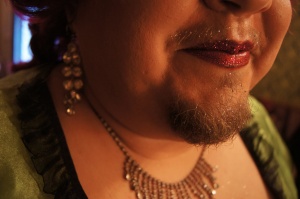
This notion of queer as an unattainable ideal is really messed up. What happened to queer as an umbrella term? What happened to the ever-expanding joyful list of people we love: LGBTTSIQQA (Lesbian Gay Bisexual Transgender Transsexual / Two-Spirited Intersex Queer Questioning Asexual)? Unlike slightly mad UK feminist Julie Bindel, I love the idyllic aspirations of queer. The way it wants to join all us freaks together. So it made me really sad, upon moving to Berlin, to realise just how much queer doesn’t want me.
What I want to see from queer communities worldwide, what I think would be truly queer, is a celebration of difference that leads to diversity in our relationships, our beds and on our dance floors. Maybe it is human nature to form group norms (safety in numbers) but I am a political optimist. I think we can do better. Let’s start to really celebrate differences, the freaks and the outcasts. It takes a lot of courage, but I think we can do it. Surely individuality is what is queer.

